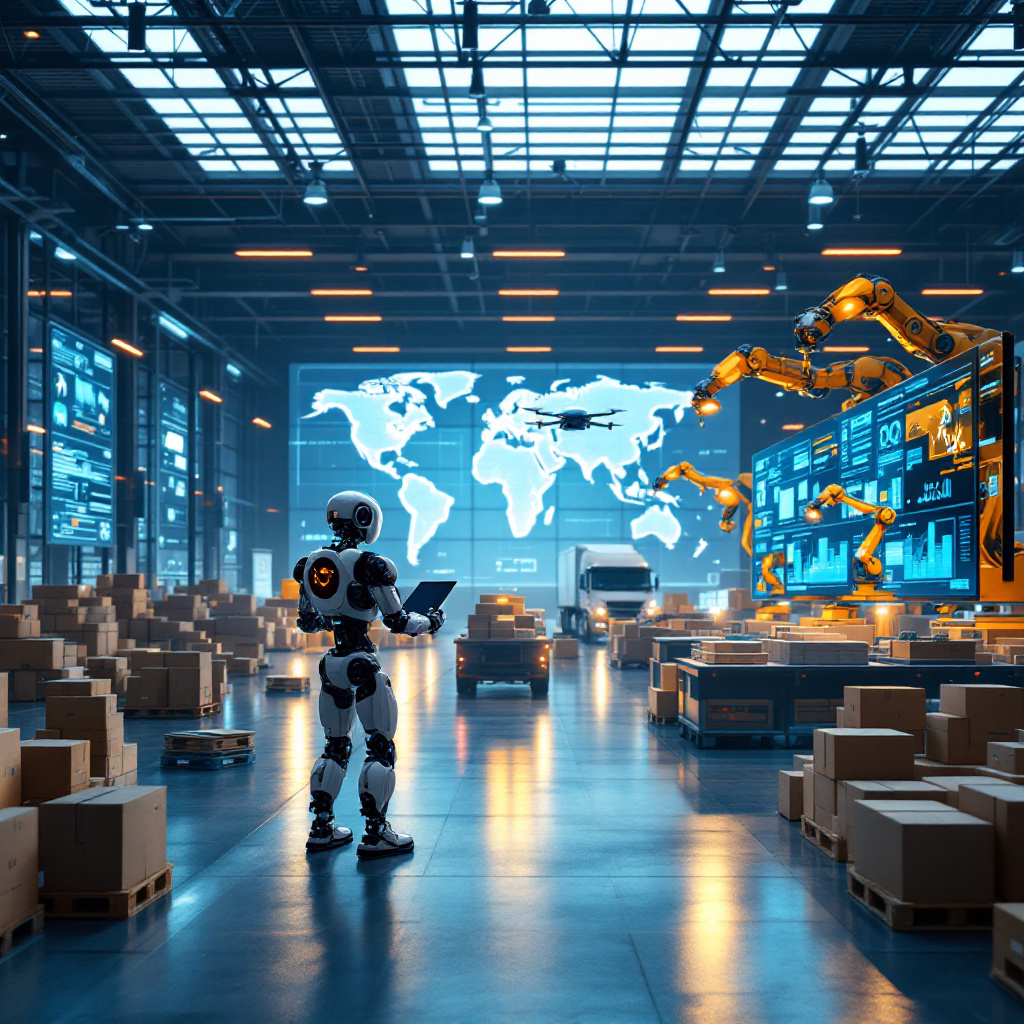Tekoäly (AI) muuttaa logistiikka-alaa. Se virtaviivaistaa toimintoja, vähentää kustannuksia ja lisää tehokkuutta. Integroimalla tekoäly osaksi logistiikka, yritykset voivat automatisoida päätöksiä, ennustaa kysyntää ja parantaa toimituksia. Katsotaanpa, miten tekoäly parantaa logistiikkaa ja toimitusketjun hallintaa.
1. Tekoäly reitin optimoinnissa
Tekoälyjärjestelmät optimoivat reittejä analysoimalla reaaliaikaisia tietoja. Ne ottavat huomioon liikenteen, sään ja historialliset trendit löytääkseen parhaat toimitusreitit. Koneoppiminen auttaa näitä algoritmeja mukautumaan nopeasti, mikä vähentää polttoaineen käyttöä ja toimitusaikoja. Amazonin ja FedExin kaltaiset yritykset käyttävät tekoälyä tehostaakseen viimeisen mailin toimituksia ja varmistaakseen, että tavarat saapuvat ajoissa.
2. Varastoautomaatio tekoälyn avulla
Varastoissa tekoälyohjatut robotit parantavat toimintaa. Nämä järjestelmät tehostavat varastonhallintaa, lajittelua ja pakkaamista. Autonomiset liikkuvat robotit (AMR) työskentelevät ihmishenkilöstön rinnalla nopeutta ja tarkkuutta parantaen. Tekoäly (AI) ennustaa myös kysyntämalleja, mikä auttaa yrityksiä ylläpitämään optimaalisia varastotasoja ja vähentämään ylimääräistä varastoa. Tämä lisää tehokkuutta ja alentaa työvoimakustannuksia.
3. Ennakoiva analytiikka kysynnän ennustamisessa
Tekoäly analysoi aiempia myyntitietoja ja markkinatrendejä ennustamaan tulevaa kysyntää. Tämä auttaa yrityksiä optimoimaan varastotasoja ja välttämään ylivarastointia tai varastovajeita. Vähittäiskauppiaat ja sähköisen kaupankäynnin yritykset käyttävät tekoälyyn perustuvaa ennustamista varmistaakseen, että niillä on oikeat tuotteet saatavilla silloin, kun niitä tarvitaan.
4. Petosten havaitseminen ja turvallisuus
Tekoälyllä on keskeinen rooli logistiikan turvallisuudessa. Se tunnistaa epäilyttävät toimet, kuten petokset ja rahtivarkaudet. Koneoppimisalgoritmit havaitsevat poikkeamat lähetystiedoissa ja varoittavat yrityksiä mahdollisista riskeistä. Tekoälyllä toimivat valvontajärjestelmät parantavat myös varastojen ja kuljetuskeskusten turvallisuutta.
5. Chatbotit ja tekoälyavusteinen asiakaspalvelu
Tekoälychatbotit muuttavat logistiikan asiakaspalvelua. Ne käsittelevät tiedusteluja, seuraavat lähetyksiä ja tarjoavat reaaliaikaisia päivityksiä, mikä vähentää ihmisen puuttumisen tarvetta. Luonnollisen kielenkäsittelyn (NLP) avulla chatbotit ymmärtävät asiakkaiden kysymyksiä ja vastaavat niihin tarkasti. Tämä lisää asiakastyytyväisyyttä ja antaa henkilöstölle mahdollisuuden keskittyä monimutkaisiin tehtäviin.
6. Tekoälyä kestävään logistiikkaan
Tekoäly auttaa logistiikkayrityksiä vähentämään ympäristövaikutuksiaan. Se optimoi energiankäyttöä ja vähentää hiilidioksidipäästöjä. Älykkäät kalustonhallintajärjestelmät analysoivat polttoaineenkulutusta ja ehdottavat ympäristöystävällisiä reittejä. Tekoäly suosittelee myös vähäpäästöisempiä kuljetusmenetelmiä, mikä edistää vihreämpää teollisuutta.
7. Autonomiset ajoneuvot ja lennokit
Itsestään ajavat kuorma-autot ja tekoälydronet muuttavat logistiikkaa. Nämä teknologiat vähentävät riippuvuutta ihmiskuljettajista ja parantavat toimitusten tehokkuutta. Teslan ja Waymon kaltaiset yritykset kehittävät autonomisia kuorma-autoratkaisuja, ja Amazon testaa lennokkeja viimeisen kilometrin toimituksia varten. Nämä innovaatiot lupaavat nopeampia ja tehokkaampia toimitusvaihtoehtoja.
Päätelmä
Tekoälyn integroiminen logistiikkaan on olennaisen tärkeää yrityksille, jotka pyrkivät lisäämään tehokkuutta, leikkaamaan kustannuksia ja parantamaan asiakastyytyväisyyttä. Ennakoivasta analytiikasta ja automaatiosta tekoälyn turvallisuuteen ja kestävyyteen, yritykset voivat hyödyntää tekoälyä pysyäkseen kilpailukykyisinä. Ne, jotka omaksuvat tekoälyn, saavat nauttia älykkäämmistä, nopeammista ja tehokkaammista toimitusketjuista. Kun tekoälyteknologia kehittyy, sen sovellukset logistiikassa laajenevat ja johtavat entistä suurempiin innovaatioihin alalla.

 Miten hyödyntää tekoälyä logistiikassa?">
Miten hyödyntää tekoälyä logistiikassa?">
